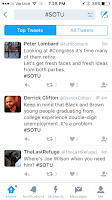As technology had developed media followed shortly after. From pamphlets and newspapers, to the oratory of radio, then visual for the TV and not only affordable but free accessibility to surmountable amounts of information, and it is a beautiful and remarkable resource we have come to create for ourselves. But... it seems to me that in the beginning of these technology and media co-evolution people enjoyed being entertained, but they also valued being informed at an affordable cost. Now it seems we have blended the two values to create "infotainment."
Also the surmountable information provided by the internet seems to have given us the inherent right that information should be free. David Raanan writes in his in his Linked-Post "Do We Care More About Being Entertained Than About Being Politically Informed?," that our culture has put on emphasis on entertainment and we now subjected to a "Darwinian process [where] the less entertaining is weeded out [and] the more entertaining survives to be broadcasted," or now with social media shared, retweeted, and reposted with the identity of a hashtag. Along with entertainment comes the value of escape, because we can opt out when we don't want to be informed or when we aren't being entertained enough. No wonder mediums are now competing with other mediums for our attention and fact and opinion are hard to decipher between the two. Because media is willing to exploit whatever to get our attention for profit, and now we are doing it to ourselves on social media. This is becoming the norm and why we are being desensitized.
Despite the negative intro I don't think everything in the media is bad, there is a lot of good, a lot of information and a lot of people taking advantage of that resource, but I don't think that is of the majority. As Monica Lewinsky had as one of her points that along with our amendment right to freedom of speech and expression comes responsibility and for some reason the internet seems to throw that out the door.
One thing I didn't agree with that Lewinsky had said was that "shame cannot survive empathy." In some cases it is sadly the truth, but I think random acts of kindness can deter people from taking there own lives and show even the slightest light or bit of good in the self-consumption of shame. Like Lewinsky said "consistency creates change" and that led me to ask the question "How do you build change?" I think like most things that starts individually and individually you can start consuming social media and media with a sense of responsibility.
One way I think we can do that is by using the report feature given to us on most, if not all social media, because its not just for reporting explicit content, but you can even click on the option to say that "I'm not interested in this tweet," or Facebook Post, or Instagram picture. Instagram provides even more options that I think are powerful like "Hate speech or symbols", which could be used to try and break down stereotypes, or "Self injury" that could provide help for people that are seeking it and need it. The algorithm for those seem like a curiosity to me, but I think it can be a step in the right direction.
I know over the past two years my consumption of social media has dramatically declined, keeping up with a few people from time to time, but I think it is because I hated wasted my timing on things or even people I didn't care about. I have gone through and tried to filter people into groups, but still haven't seen the changes in my feed like I have wanted. I think the report feature is worth a shot to try and help me filter through social media to make it a more powerful tool for myself.
To see a consistent change in our culture today I think we have to re-separate our values of being informed and entertained and realize the value and opportunity we have to be informed. Individually that starts we us becoming more conscious of what we want and don't not want to be consuming, which is a goal I have been working toward and want to continue to do so.





































